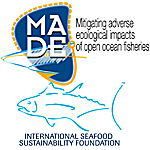Research on fishing-related stress indicates that the physiological effects and survival of released fish after capture is not well understood. This study investigates the stress response in sharks captured by pelagic and demersal longline operations and documents the post-release survival for some species. Blood stress parameters (electrolytes and metabolites) were collected from sharks after capture on longline gear and, when possible, pop-up satellite archival tags were used to determine post-release survival. In general, the level of stress increased with the duration of time on the line and the magnitude of the stress response was species specific with pelagic sharks having a more pronounced stress response relative to demersal species. However, the at-vessel mortality for demersal species ranged from as little as 3 to as much as 12 hours of being hooked on the on the longline. Taken together, the blood properties of longline-captured sharks appear to be useful indicators of interspecific variation in the stress response to capture, and offer insight into the post-release survival when verified with satellite tags.
|
|
|
Browse by Author > Marshall Heather
Wednesday
17
Session 6: MITIGATION TECHNIQUES IN LONGLINE FISHERIES
› 16:00 - 16:20 (20min) › Auditorium
Stress response and post-release survival of longline captures sharks
1 : University of Massachusetts
University of Massachusetts
285 Old Westport Rd. Darmouth, MA 02790 -
United States
2 : University of Massachusetts
University of Massachusetts
3 : Massachusetts Division of Marine Fisheries
* : Corresponding author
838 South Rodney French Blvd New Bedford, MA 02744 -
United States
|
| Online user: 1 | RSS Feed |

|

 PDF version
PDF version